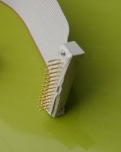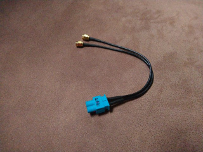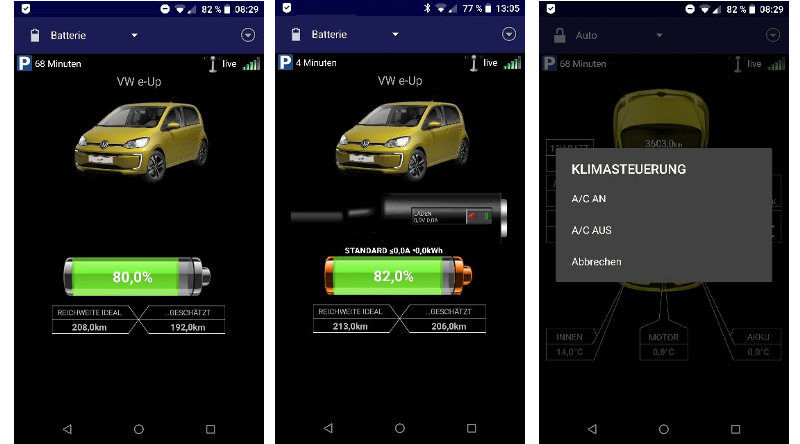VW e-Up via Comfort CAN (T26A)
Vehicle Type: integrated in VWUP
This part was the initial code for the OVMS VWUP vehicle module. Development started in January 2020 by Chris van der Meijden.
It supports the VW e-UP (2013-, 2020-), Skoda Citigo E IV and the Seat MII electric (2020-) directly connected to the comfort can bus through the ‘T26A’ socket.
Support Overview
Function |
Support Status |
|---|---|
Hardware |
Any OVMS v3 (or later) module. Vehicle support: 2020- (2013- VW e-Up as well) |
Vehicle Cable |
Comfort CAN T26A (OCU connector cable, located under front passenger seat) to DB9 Data Cable for OVMS using pin 6 and 8 for can3 |
GSM Antenna |
T4AC - R205 with fakra_sma adapter cable or 1000500 Open Vehicles OVMS GSM Antenna (or any compatible antenna) |
GPS Antenna |
T4AC - R50 with fakra_sma adapter cable or 1020200 Universal GPS Antenna (or any compatible antenna) |
SOC Display |
Yes |
Range Display |
Yes |
Cabin Pre-heat/cool Control |
Yes |
GPS Location |
Yes (from modem module GPS) |
Speed Display |
Yes |
Temperature Display |
Yes (outdoor, cabin) |
BMS v+t Display |
No |
TPMS Display |
No |
Charge Status Display |
Yes |
Charge Interruption Alerts |
Yes (per notification on the charging state) |
Charge Control |
tba |
Lock/Unlock Vehicle |
No |
Valet Mode Control |
No |
Others |
Odometer, trip, VIN, status of lock, plug, lights, doors, trunk and bonnet |
Pinout OCU T26A - OVMS DB9 adapter
For the T26A approach we directly tap into the comfort can bus via the original OCU cable.
The OCU connector is located under the passenger seat.

Advantage is the direct write access to the comfort can bus.
Disadvantage is that we won’t be able to access all control units of the car.
OCU |
DB9-F |
Signal |
|---|---|---|
26 |
3 |
Chassis / Power GND |
. |
2 |
can1 L (Can Low, not used) |
. |
7 |
can1 H (Can High, not used) |
. |
4 |
can2 L (Can Low, not used) |
. |
5 |
can2 H (Can High, not used) |
2 |
6 |
can3 L (Comfort-can Low) |
14 |
8 |
can3 H (Comfort-can High) |
1 |
9 |
+12V Vehicle Power |
For confectioning the T26A adapter cable you can use a standard 26 pin ribbon cable (2x13 pins, 2,54mm grid dimension) and a DB9 female D-Sub connector. You will need to grind down the rim of the socket of the ribbon cable.
To make a GSM/GPS adapter cable to connect to the original VW fakra socket you can use a double fakra male connector with two SMA male connectors attached.


User notes
Remove the passenger seat (on right hand drive cars the driver’s seat).
Open the carpet lid.
Disconnect the T26A cable and the fakra cable from the OCU (online communication unit).
Remove the OCU.
Connect the confectioned T26A adapter DB9 cable attached to the OVMS to the VW T26A connector of the car.
Connect your GMS/GPS fakra adapter to the VW fakra cable.
Fit OVMS in the compartment.
Close the carpet lid.
Reinstall the passenger seat.
Configure OVMS as described in the OVMS user manual.
Configure ‘Model year’, ‘Can write access’ and ‘Connection type’ under VW e-Up -> Features.
‘Model year’ and ‘Can write access’ can also be set from within the app (FEATURES 20 and 15).
Register and connect OVMS to a server (as guided within the OVMS setup).
Turn the ignition in the car on and off to receive initial values (also needed after updates).
Install the OVMS app on your smartphone or tablet and configure it to connect to the server.
Enjoy :-)

Climate control
Climate control works, as long as write access to the comfort can has been enabled in the app or in the OVMS webinterface (VW e-Up -> Features).
To turn on or off the AC from within the Android app just press the “A/C” button. Within the iOS app press “Homelink 1” for AC on and “Homelink 2” for AC off.
Once the AC is turned on by the app there will be a delay of about 17 seconds untill the AC actually starts in the car. Further 10 seconds all communication from the app to the car is blocked.
The communication from the app to the car is also blocked for 10 seconds after the “AC off” command from the app to the car. There is no delay between the “AC off” signal of the app and the actually turning off in the car.
In rare cases ‘AC off’ does not respond. There will be a delay of 40 seconds before you can try again.
The cabin target temperature can be set from the OVMS webinterface (VW e-Up (Komfort CAN) -> Climate control) or via the app under FEATURES 21.

IDs on Comfort CAN Bus
ID |
Conversion |
Unit |
Function |
|---|---|---|---|
61A |
d7/2 |
% |
State of Charge (relative) |
320 |
(d4<<8+d3-1)/190 |
km/h |
Speed |
65F |
3 Msg d5-7,d1-7,d1-7 |
String |
VIN number |
571 |
5+(.05*d0) |
Volt |
12 Volt battery voltage |
65D |
d3&f<<12|d2<<8|d1 |
km |
Odometer |
3E3 |
(d2-100)/2 |
°C |
Cabin temperature |
527 |
(d5/2)-50 |
°C |
Outdoor temperature |
531 |
d0 00 |
Headlights off |
|
52D |
d0 +255 if d1 41 |
km |
Calculated range |
381 |
d0 02 |
Status doors locked |
|
470 |
d1 1,2,4,8,20,10 |
Integer Doors, trunk, hood opened or closed |
|
3E1 |
d4 |
Integer Blower speed?(57,66,7D,98,BB,DE,FA) |
|
575 |
d0 00 to 0F |
Integer Key position |
|
575 |
d3 00 or 10 |
windshield heater (off or on) |
|
569 |
b07 |
“AC”-LED |
|
69C |
d1/10+10 |
°C |
temperature setpoint for remote AC (only in message D2 <d1> 00 1E 1E 0A 00 00) |
61C |
d2 < 07 |
bool |
Charging detection |
43D |
d1 01 or 11 |
TX: Working or sleeping in the ring |
|
5A7 |
d1 16 |
TX: OCU AC blocking signal |
|
5A9 |
all 00 |
TX: OCU heartbeat |
|
69E |
multiple msg d0 C1 d6 xx |
°C |
TX: AC on / off signals TX: set cabin temperature for 69C |
Development notes
Under this vehicle component part we use the original T26A approach, which can write to the comfort can and is able to manage the climate control of the car.
You will normally use the OVMS binaries provided i.e. here.
The VWUP T26A component part with working climate control is publicly available within the OVMS binary version 3.2.15 ‘edge’ and upwards (‘main’, ‘eap’ and ‘edge’). The Android app version has to be 3.17.1 or higher to have access to the climate control functions for this vehicle component.
If you want to compile the binary yourself you will need to read the OVMS development documentation on how to set up the tool chain, check out the repository and the submodules and copy the file
sdkconfig.default.hw31
from the OVMS.V3/support folder to the OVMS.V3 folder and rename it to
sdkconfig
Vehicle log files
To be able to implement the VWUP vehicle component for OVMS the CAN logging of the VW e-UP provided by ‘sharkcow’ was of tremendous help.
The implementation of this vehicle component could not have been done without these great files.
They can be found here: